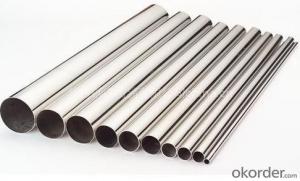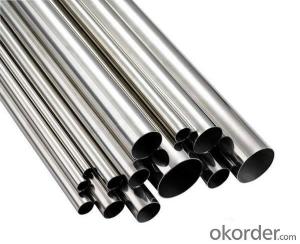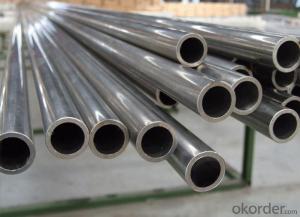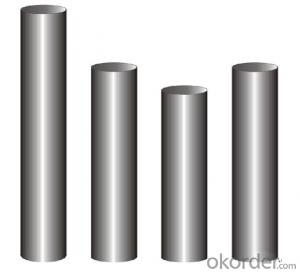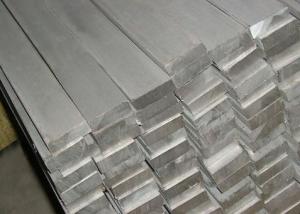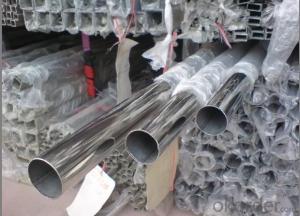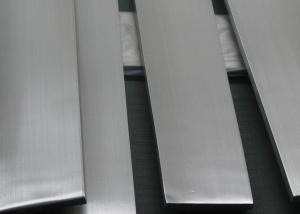Boiler Heat Exchange Stainless Steel Pipe 2205
- Loading Port:
- Tianjin
- Payment Terms:
- TT OR LC
- Min Order Qty:
- 1 m.t.
- Supply Capability:
- 1000 m.t./month
OKorder Service Pledge
OKorder Financial Service
You Might Also Like
Product Description:
1、Structure of Boiler Heat Exchange Stainless Steel Pipe 2205 ASTM A213 Description:
Boiler Heat Exchange stainless steel pipe is often used in the heating system. Heating system, or those stored energy (such as solar energy) in the form of heat, need to be built with the material that can withstand temperatures up to 550 degrees Celsius. High chromium molybdenum welded steel pipe can work in the extreme, which maintain as the ideal material for the construction of power station.
2、Main Features of Boiler Heat Exchange Stainless Steel Pipe 2205 ASTM A213:
• High manufacturing accuracy
• High strength
• Small inertia resistance
• Strong heat dissipation ability
• Good visual effect
•Reasonable price
3、Boiler Heat Exchange Stainless Steel Pipe 2205 ASTM A213 Images:
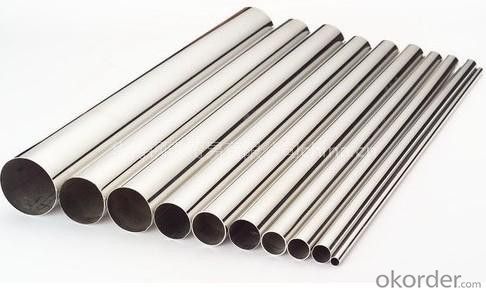
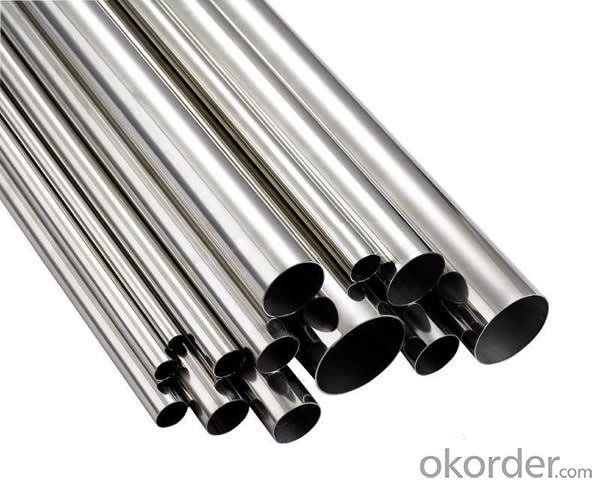
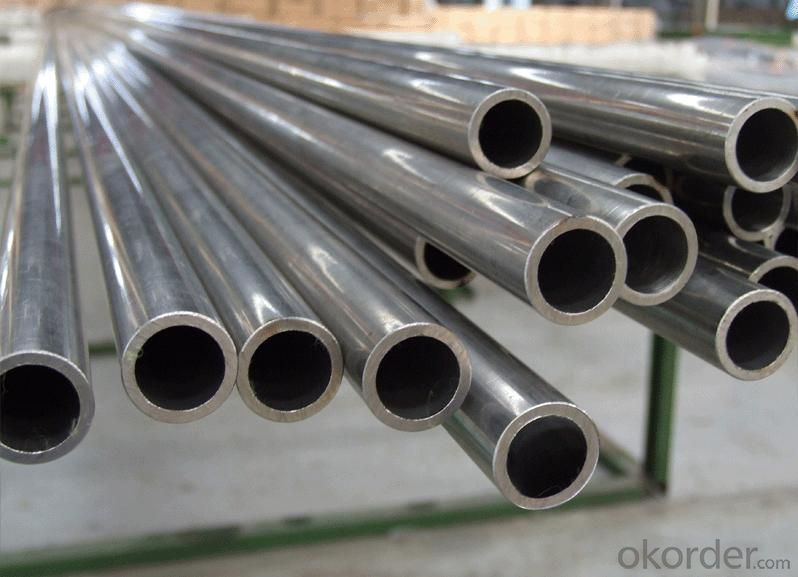
4、Boiler Heat Exchange Stainless Steel Pipe 2205 ASTM A213 Specification:
1)Commodity: heat exchanger pipe
2))Material: 304,316L,304L,316,321,310S,etc
3)Thickness:0.5-100mm
4)Length: 1-14m
| Material Grade | 304,304L,316 ,316L,321,310S,2205,904and so on. |
| Standard | ASTM A312, A554, A249, A269 and A270,ect |
| DIN 17456-85 , DIN 17458-85, DIN 17459-92,ect | |
| JIS G3446-1994, JIS G3448-1997, JIS G3459-1997, JIS G3463-1994,ect | |
| GB13296-1991, GB14975-2002, GB14976-2002,ect | |
| Outer Diameter | 13.7-2020mm |
| Thickness | 0.5-50mm |
| Length | 1m -12m or as customers' request |
| Polish | 180G, 320G, 400G Satin / Hairline |
| 400G, 500G, 600G or 800G Mirror finish | |
| Test | eddy current inspection, ultrasonic inspection, X-ray inspection, real-time imaging, hydrostatic test, spectral analysis, intergranular corrosion, water pressure test, and mechanical property testing facilities. |
| Payment | 1) by L/C at sight, |
| 2) 30% deposit, 70% balance before Shipping. | |
| Delivery time | A.7 days if this goods is stock goods. |
| B.25 days if this goods will be produced after order | |
| Validity | Valid time is 3 days for price usually. |
| Payment terms | FOB Tianjin |
| MOQ | 1 ton |
| Capacity | 1000 ton per month |
| Certificate | ISO, SGS, and third part inspection |
| Applications | the products are widely used in chemical industry, condenser pipe, heat exchanger, petroleum, shipping military, environment protection, high temperature resistant, low temperature resistant, corrosion resistant and so on. |
| packing details | 1) Wooden-box Package. 2) The Wooden Frame Packing. 3) Intertexture Cloth Packaging with the Iron Sheet Bonding and the Two Terminals Covered With Plastic Dome. |
5、FAQ of Boiler Heat Exchange Stainless Steel Pipe 2205 ASTM A213 :
①How is the quality of your products?
Our products are manufactured strictly according to national and internaional standard, and we take a test on every pipe before delivered out. If you want see our quality certifications and all kinds of testing report, please just ask us for it.
Guaranteed: If products’ quality don’t accord to discription as we give or the promise before you place order, we promise 100% refund.
②How about price?
Yes, we are factory and be able to give you lowest price below market one, and we have a policy that “ for saving time and absolutely honest business attitude, we quote as lowest as possible for any customer, and discount can be given according to quantity”,if you like bargain and factory price is not low enough as you think, just don’t waste your time.Please trust the quotation we would give you, it is professional one.
③Why should you chose us?
Chose happens because of quality, then price, We can give you both.Additionally, we can also offer professional products inquiry, products knowledge train(for agents), smooth goods delivery, exellent customer solution proposals.Our service formula: good quality+good price+good service=customer’s trust
SGS test is available, customer inspection before shipping is welcome, third party inspection is no problem.
Any question, pls feel free to contact us !
- Q:Are stainless steel pipes suitable for sewage treatment plants?
- Yes, stainless steel pipes are suitable for sewage treatment plants. Stainless steel is a highly durable and corrosion-resistant material, making it well-suited for the harsh and corrosive environment found in sewage treatment plants. The high resistance to corrosion prevents the pipes from deteriorating over time, ensuring a longer lifespan and reducing the need for frequent maintenance or replacements. Additionally, stainless steel pipes have excellent hygienic properties, which is crucial for sewage treatment plants to maintain proper sanitation. The smooth surface of stainless steel pipes prevents the accumulation of bacteria, biofilm, and other contaminants, making it easier to clean and maintain a high level of cleanliness. Furthermore, stainless steel is environmentally friendly as it is 100% recyclable, contributing to sustainable practices in sewage treatment plants. Overall, stainless steel pipes are a reliable and suitable choice for sewage treatment plants due to their durability, corrosion resistance, hygienic properties, and environmental friendliness.
- Q:Can stainless steel pipes be used for underground installations?
- Yes, stainless steel pipes can be used for underground installations. Stainless steel is known for its excellent corrosion resistance, which makes it suitable for underground environments where moisture and chemicals are present. It is also highly durable and can withstand harsh conditions, making it a reliable choice for underground installations. Additionally, stainless steel pipes offer high strength and are resistant to cracking or damage, ensuring the longevity of the installation. Overall, stainless steel pipes are a popular choice for underground applications due to their corrosion resistance, durability, and strength.
- Q:Can stainless steel pipes be used for underground irrigation systems?
- Underground irrigation systems can indeed utilize stainless steel pipes. This material, known for its durability and resistance to corrosion, proves apt for instances where the pipes come into contact with moisture and soil conditions. Due to its ability to withstand high pressure and temperature variations, stainless steel stands as a favored option for underground irrigation systems. Furthermore, its extended lifespan surpasses that of alternative materials, thereby diminishing the necessity for frequent repairs or replacements. Nevertheless, it remains crucial to guarantee proper installation and insulation of the pipes to avert potential damage caused by soil movement or external factors.
- Q:Can stainless steel pipes be used for pulp and paper industry applications?
- Yes, stainless steel pipes can be used for pulp and paper industry applications. Stainless steel is a highly durable and corrosion-resistant material, which makes it suitable for various industrial applications, including those in the pulp and paper industry. The industry involves the transportation of corrosive chemicals and liquids, such as acids, bleaching agents, and solvents, which can degrade and corrode regular pipes over time. Stainless steel pipes, on the other hand, are resistant to corrosion and can withstand the harsh chemicals and high temperatures commonly found in pulp and paper plants. Additionally, stainless steel pipes are also hygienic and easy to clean, making them suitable for applications where cleanliness is essential, such as food-grade paper production. Overall, stainless steel pipes are a reliable and long-lasting choice for the pulp and paper industry.
- Q:Can stainless steel pipes be used for chemical processing?
- Yes, stainless steel pipes can be used for chemical processing. Stainless steel has excellent corrosion resistance and high temperature resistance, making it suitable for handling various chemicals and maintaining the integrity of the process.
- Q:Are stainless steel pipes suitable for chemical storage tanks?
- Yes, stainless steel pipes are typically suitable for chemical storage tanks. Stainless steel is highly resistant to corrosion and can withstand the harsh chemicals stored in tanks, making it a preferred material for chemical storage applications.
- Q:Can stainless steel pipes be tempered?
- No, stainless steel pipes cannot be tempered.
- Q:Difference between stainless steel and steel pipe
- Stainless steel (Stainless Steel) is referred to as the stainless steel, the resistance of air, steam, water and other weak corrosive medium or with stainless steel known as stainless steel; while the resistance to chemical corrosion (acid, alkali and salt chemical etching) corrosion of steel called acid resistant steel. Because of the difference in the chemical composition of the two, and make their corrosion resistance is different, ordinary stainless steel is generally not resistant to chemical medium corrosion, and acid resistant steel are generally stainless steel.
- Q:What is the difference between 17-4 and 15-5 stainless steel pipes?
- The main difference between 17-4 and 15-5 stainless steel pipes lies in their chemical compositions and resulting mechanical properties. 17-4 stainless steel contains approximately 17% chromium and 4% nickel, while 15-5 stainless steel contains about 15% chromium and 5% nickel. As a result, 17-4 stainless steel has higher levels of both chromium and nickel, providing better corrosion resistance and improved strength compared to 15-5 stainless steel. However, 15-5 stainless steel offers superior toughness and ease of welding. Ultimately, the choice between these two types of stainless steel pipes depends on the specific requirements of the application and the desired balance between corrosion resistance, strength, and weldability.
- Q:Are stainless steel pipes suitable for paper and pulp industry?
- Yes, stainless steel pipes are highly suitable for the paper and pulp industry. The paper and pulp industry involves the processing of various corrosive chemicals, high temperatures, and high-pressure conditions. Stainless steel pipes offer excellent resistance to corrosion, heat, and pressure, making them ideal for this industry. Stainless steel pipes have a high level of resistance to chemicals such as chlorine dioxide, bleaching agents, and other corrosive substances used in the paper and pulp industry. This resistance ensures that the pipes do not corrode or deteriorate over time, preventing leakage and ensuring the integrity of the piping system. Additionally, stainless steel pipes have excellent heat resistance, allowing them to withstand the high temperatures involved in the paper and pulp production process. They can handle both hot and cold liquids without any significant impact on their performance or structural integrity. Furthermore, stainless steel pipes have high strength and durability, making them capable of handling the high-pressure conditions often found in the paper and pulp industry. They can withstand the force and stress exerted by the fluids being transported, ensuring a reliable and long-lasting piping system. Moreover, stainless steel pipes are easy to clean and maintain, which is vital in industries with strict hygiene and sanitation requirements like the paper and pulp industry. Their smooth surface prevents the accumulation of debris and contaminants, reducing the risk of contamination and ensuring the quality of the final product. In conclusion, stainless steel pipes are highly suitable for the paper and pulp industry due to their resistance to corrosion, heat, and pressure. They provide a durable, reliable, and hygienic piping solution, making them an excellent choice for this industry.
1. Manufacturer Overview |
|
|---|---|
| Location | |
| Year Established | |
| Annual Output Value | |
| Main Markets | |
| Company Certifications | |
2. Manufacturer Certificates |
|
|---|---|
| a) Certification Name | |
| Range | |
| Reference | |
| Validity Period | |
3. Manufacturer Capability |
|
|---|---|
| a)Trade Capacity | |
| Nearest Port | |
| Export Percentage | |
| No.of Employees in Trade Department | |
| Language Spoken: | |
| b)Factory Information | |
| Factory Size: | |
| No. of Production Lines | |
| Contract Manufacturing | |
| Product Price Range | |
Send your message to us
Boiler Heat Exchange Stainless Steel Pipe 2205
- Loading Port:
- Tianjin
- Payment Terms:
- TT OR LC
- Min Order Qty:
- 1 m.t.
- Supply Capability:
- 1000 m.t./month
OKorder Service Pledge
OKorder Financial Service
Similar products
New products
Hot products
Hot Searches
Related keywords
